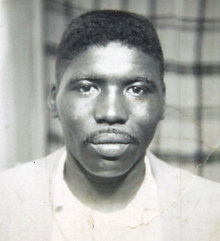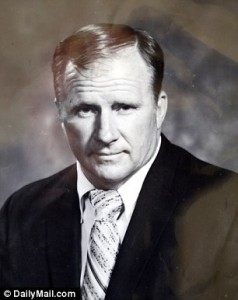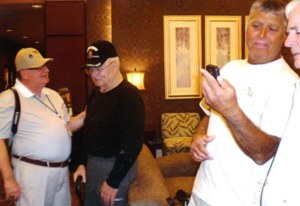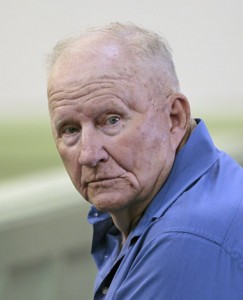Readers of this site and of CounterPunch know that Medic’s decorated Grenadian friend Roger Byer, upon completing his tour with Charlie 1/5 First Cavalry in Vietnam and Cambodia, returned home, only to be arrested by the Cav when the US invaded Grenada. By odd coincidence, Roger was a platoon mate of Sgt. James Bonard Fowler, the man who sparked the Civil Rights movement.
Stateside
 In 1965, as the civil rights movement was simmering, Alabama State Policeman James Bonard Fowler shot and killed Jimmie Lee Jackson, an unarmed black man. He and around five hundred people had just left the Zion United Methodist Church in Marion, Alabama. They were attempting to peacefully walk to the City Jail, about a half block away, where a young civil rights worker was being held. They were met by Marion City police officers, sheriff’s deputies and Alabama state troopers. In the standoff, streetlights were switched off (some sources say the police shot them out) and the police began to beat the protestors. Two UPI photographers were clubbed, their cameras were smashed, and an NBC News correspondent was hospitalized for his injuries.
In 1965, as the civil rights movement was simmering, Alabama State Policeman James Bonard Fowler shot and killed Jimmie Lee Jackson, an unarmed black man. He and around five hundred people had just left the Zion United Methodist Church in Marion, Alabama. They were attempting to peacefully walk to the City Jail, about a half block away, where a young civil rights worker was being held. They were met by Marion City police officers, sheriff’s deputies and Alabama state troopers. In the standoff, streetlights were switched off (some sources say the police shot them out) and the police began to beat the protestors. Two UPI photographers were clubbed, their cameras were smashed, and an NBC News correspondent was hospitalized for his injuries.
Chased by ten Alabama state troopers, Jimmie Lee Jackson, aged twenty-six; and his mother, Viola Jackson; and his eighty-two year-old grandfather, Cager Lee; and others ran to Mack’s Cafe. Police clubbed the grandfather, who fell to the floor. His daughter, Viola, rushed to his aid. Jimmie Jackson rushed to his mother’s aid and was shot twice in the abdomen by Fowler. He died a week later.
Fowler claimed he acted self-defense after Jackson grabbed his gun from its holster. After two grand juries failed to indict him, Fowler was transferred to the police department in Birmingham and promoted. Some time after the incident he stated: “I don’t remember how many times I pulled the trigger, but I think I just pulled it once, but I might have pulled it three times. I don’t remember. I didn’t know his name at the time, but his name was Jimmie Lee Jackson. He weren’t dead. He didn’t die that night. But I heard about a month later that he died.”
his gun from its holster. After two grand juries failed to indict him, Fowler was transferred to the police department in Birmingham and promoted. Some time after the incident he stated: “I don’t remember how many times I pulled the trigger, but I think I just pulled it once, but I might have pulled it three times. I don’t remember. I didn’t know his name at the time, but his name was Jimmie Lee Jackson. He weren’t dead. He didn’t die that night. But I heard about a month later that he died.”
The shooting sparked the first Selma to Montgomery march that occurred a few days later on what became known as Bloody Sunday.
One year later, while at the Alabaster Alabama Police Department, Fowler allegedly shot thirty-four year old Nathan Johnson, who’d been arrested for suspicion of drunken driving. Officers said Johnson had grabbed a billy club from Fowler and was attacking him when Johnson was shot twice in the chest. Subsequently, both killings were removed from Fowler’s personnel records.
In 1968, Fowler was dismissed from the state police for severely beating his supervisor, T.J. Barden, who had given Fowler a low performance rating. State troopers who witnessed the event saw Fowler ram Barden’s head into a car windshield, knocking him unconscious. Fowler appealed his firing, but lost the case. Not long afterward, his brother, CSM Robert Allen Fowler, assigned to C 1/5 First Cavalry, was killed in Vietnam. Having previously served in the military, at age thirty-five Fowler joined the Army to avenge his brothers death. After basic and advanced infantry training he was sent overseas to his brothers old unit.
Vietnam
By an odd coincidence, James Fowler and Medic’s friend Roger Byer (see Grenada: A Soldier’s Story, and  The Colonel in His Starched Fatigues) both served in Charlie 1/5 in 1970. When I asked Roger to comment on Sgt. Fowler in combat (his nickname was Pop Frag) he declined, noting only that an officer of mutual acquaintance felt much the same as he. However men on Charlie company’s Facebook page recall Fowler with fond regards. Medic obtained Fowler’s redacted military personnel file from the National Archives in Saint Louis. His war record is impressive.
The Colonel in His Starched Fatigues) both served in Charlie 1/5 in 1970. When I asked Roger to comment on Sgt. Fowler in combat (his nickname was Pop Frag) he declined, noting only that an officer of mutual acquaintance felt much the same as he. However men on Charlie company’s Facebook page recall Fowler with fond regards. Medic obtained Fowler’s redacted military personnel file from the National Archives in Saint Louis. His war record is impressive.
Fowler’s postwar years are fuzzy. He married a Thai woman and lived in Thailand, returning to Alabama several months a year. He had the misfortune to spend nearly five years in a Thai prison for either running drugs or being framed for the crime. In that matter, Fowler had previously acted as a prosecution witness in a murder for hire case, in which Green Beret Sergeant Major Edward J. Gleason, involved in an Okinawa-Thai smuggling ring, enlisted Fowler to kill a superior officer. Fowler and a person of authority believed he was later framed in retaliation for his testimony. While jailed, Senator John McCain advocated on his behalf.
In 2007, forty-one years after the event, Fowler was charged with first degree and second degree murder for the death of Jimmie Lee Jackson. In 2010 he pleaded guilty to one count of second-degree manslaughter, and apologized for the shooting, but reiterated he had acted in self-defense, believing that Jackson was trying to grab his gun. He was sentenced to six months in prison and was released after serving five months due to health problems which required surgery.
In 2005, Fowler’s daughter, Tracey Schraeder Fowler, sued him, claiming he beat her in the back of the head, and choked her. Fowler counter-sued, claiming his daughter owed him $5,000 and she assaulted him; he prevailed in court. In 2015 Schraeder Fowler told the UK website Daily Mail.com that her father was an American hero and not racist. Interviewed by John Flemming of The Anniston Star, Fowler claimed that he’d been born and raised among blacks, but was unsettled by the civil rights movement:
 “I’m on the side of J. Edgar Hoover. I think [Martin Luther King] was a con artist. I don’t think he’s got a snowball’s chance in hell of getting into heaven. No more chance than I do. His goal was to screw and fuck over every white woman that he could.”
“I’m on the side of J. Edgar Hoover. I think [Martin Luther King] was a con artist. I don’t think he’s got a snowball’s chance in hell of getting into heaven. No more chance than I do. His goal was to screw and fuck over every white woman that he could.”
“They don’t want to be called nigger, they don’t wanna be called jigaboos. But they won’t hesitate to call you a honky, a redneck, a cracker and,” gesturing to his wife, “her a slope head or a slant eye, fucking gook. They won’t hesitate to do that. They won’t hesitate to wear their colors, green, black and red, but they will get mad if you put the Confederate flag on the front of your car. They say to hell with your heritage, your culture. And we have just surrendered to that.”
“I think that segregation was good, if it were properly done. Now, you got to give equal funds and they got to be handled right. I don’t believe in completely mixing the races. I don’t think that is gonna help anything.”
James Bonard Fowler died on 5 July 2015. A local obituary omits his law enforcement career.
Jimmy Lee Jackson was a Vietnam veteran. Medic has requested his military records from the National Archives.
The FBI’s Civil Rights-Era Cold Case Initiative is re-assessing dozens of unsolved or inadequately solved racially motivated homicides from the civil rights era. Among them is the death of Nathan Jackson, Jr. Medic has requested his military records from the National Archives.
__________
Sources
Ellensburg Daily Record October 1988
Washington Post 11 May 2007
Tuscaloosa News May 2007
New York Times 15 Nov 2010
The Hill January 2015
DailyMail.com Feburary 2015
Washington Post 8 July 2015
Anniston Star 6 March 2005/15 November 2010
Wikipedia
Democracy Now interview with Anniston Star reporter John Fleming
Roger Byer on CounterPunch

The Misfortunes of Mr. Fowler
Readers of this site and of CounterPunch know that Medic’s decorated Grenadian friend Roger Byer, upon completing his tour with Charlie 1/5 First Cavalry in Vietnam and Cambodia, returned home, only to be arrested by the Cav when the US invaded Grenada. By odd coincidence, Roger was a platoon mate of Sgt. James Bonard Fowler, the man who sparked the Civil Rights movement.
Stateside
Chased by ten Alabama state troopers, Jimmie Lee Jackson, aged twenty-six; and his mother, Viola Jackson; and his eighty-two year-old grandfather, Cager Lee; and others ran to Mack’s Cafe. Police clubbed the grandfather, who fell to the floor. His daughter, Viola, rushed to his aid. Jimmie Jackson rushed to his mother’s aid and was shot twice in the abdomen by Fowler. He died a week later.
Fowler claimed he acted self-defense after Jackson grabbed his gun from its holster. After two grand juries failed to indict him, Fowler was transferred to the police department in Birmingham and promoted. Some time after the incident he stated: “I don’t remember how many times I pulled the trigger, but I think I just pulled it once, but I might have pulled it three times. I don’t remember. I didn’t know his name at the time, but his name was Jimmie Lee Jackson. He weren’t dead. He didn’t die that night. But I heard about a month later that he died.”
his gun from its holster. After two grand juries failed to indict him, Fowler was transferred to the police department in Birmingham and promoted. Some time after the incident he stated: “I don’t remember how many times I pulled the trigger, but I think I just pulled it once, but I might have pulled it three times. I don’t remember. I didn’t know his name at the time, but his name was Jimmie Lee Jackson. He weren’t dead. He didn’t die that night. But I heard about a month later that he died.”
The shooting sparked the first Selma to Montgomery march that occurred a few days later on what became known as Bloody Sunday.
One year later, while at the Alabaster Alabama Police Department, Fowler allegedly shot thirty-four year old Nathan Johnson, who’d been arrested for suspicion of drunken driving. Officers said Johnson had grabbed a billy club from Fowler and was attacking him when Johnson was shot twice in the chest. Subsequently, both killings were removed from Fowler’s personnel records.
In 1968, Fowler was dismissed from the state police for severely beating his supervisor, T.J. Barden, who had given Fowler a low performance rating. State troopers who witnessed the event saw Fowler ram Barden’s head into a car windshield, knocking him unconscious. Fowler appealed his firing, but lost the case. Not long afterward, his brother, CSM Robert Allen Fowler, assigned to C 1/5 First Cavalry, was killed in Vietnam. Having previously served in the military, at age thirty-five Fowler joined the Army to avenge his brothers death. After basic and advanced infantry training he was sent overseas to his brothers old unit.
Vietnam
By an odd coincidence, James Fowler and Medic’s friend Roger Byer (see Grenada: A Soldier’s Story, and The Colonel in His Starched Fatigues) both served in Charlie 1/5 in 1970. When I asked Roger to comment on Sgt. Fowler in combat (his nickname was Pop Frag) he declined, noting only that an officer of mutual acquaintance felt much the same as he. However men on Charlie company’s Facebook page recall Fowler with fond regards. Medic obtained Fowler’s redacted military personnel file from the National Archives in Saint Louis. His war record is impressive.
The Colonel in His Starched Fatigues) both served in Charlie 1/5 in 1970. When I asked Roger to comment on Sgt. Fowler in combat (his nickname was Pop Frag) he declined, noting only that an officer of mutual acquaintance felt much the same as he. However men on Charlie company’s Facebook page recall Fowler with fond regards. Medic obtained Fowler’s redacted military personnel file from the National Archives in Saint Louis. His war record is impressive.
Fowler’s postwar years are fuzzy. He married a Thai woman and lived in Thailand, returning to Alabama several months a year. He had the misfortune to spend nearly five years in a Thai prison for either running drugs or being framed for the crime. In that matter, Fowler had previously acted as a prosecution witness in a murder for hire case, in which Green Beret Sergeant Major Edward J. Gleason, involved in an Okinawa-Thai smuggling ring, enlisted Fowler to kill a superior officer. Fowler and a person of authority believed he was later framed in retaliation for his testimony. While jailed, Senator John McCain advocated on his behalf.
In 2007, forty-one years after the event, Fowler was charged with first degree and second degree murder for the death of Jimmie Lee Jackson. In 2010 he pleaded guilty to one count of second-degree manslaughter, and apologized for the shooting, but reiterated he had acted in self-defense, believing that Jackson was trying to grab his gun. He was sentenced to six months in prison and was released after serving five months due to health problems which required surgery.
In 2005, Fowler’s daughter, Tracey Schraeder Fowler, sued him, claiming he beat her in the back of the head, and choked her. Fowler counter-sued, claiming his daughter owed him $5,000 and she assaulted him; he prevailed in court. In 2015 Schraeder Fowler told the UK website Daily Mail.com that her father was an American hero and not racist. Interviewed by John Flemming of The Anniston Star, Fowler claimed that he’d been born and raised among blacks, but was unsettled by the civil rights movement:
“They don’t want to be called nigger, they don’t wanna be called jigaboos. But they won’t hesitate to call you a honky, a redneck, a cracker and,” gesturing to his wife, “her a slope head or a slant eye, fucking gook. They won’t hesitate to do that. They won’t hesitate to wear their colors, green, black and red, but they will get mad if you put the Confederate flag on the front of your car. They say to hell with your heritage, your culture. And we have just surrendered to that.”
“I think that segregation was good, if it were properly done. Now, you got to give equal funds and they got to be handled right. I don’t believe in completely mixing the races. I don’t think that is gonna help anything.”
James Bonard Fowler died on 5 July 2015. A local obituary omits his law enforcement career.
Jimmy Lee Jackson was a Vietnam veteran. Medic has requested his military records from the National Archives.
The FBI’s Civil Rights-Era Cold Case Initiative is re-assessing dozens of unsolved or inadequately solved racially motivated homicides from the civil rights era. Among them is the death of Nathan Jackson, Jr. Medic has requested his military records from the National Archives.
__________
Sources
Ellensburg Daily Record October 1988
Washington Post 11 May 2007
Tuscaloosa News May 2007
New York Times 15 Nov 2010
The Hill January 2015
DailyMail.com Feburary 2015
Washington Post 8 July 2015
Anniston Star 6 March 2005/15 November 2010
Wikipedia
Democracy Now interview with Anniston Star reporter John Fleming
Roger Byer on CounterPunch